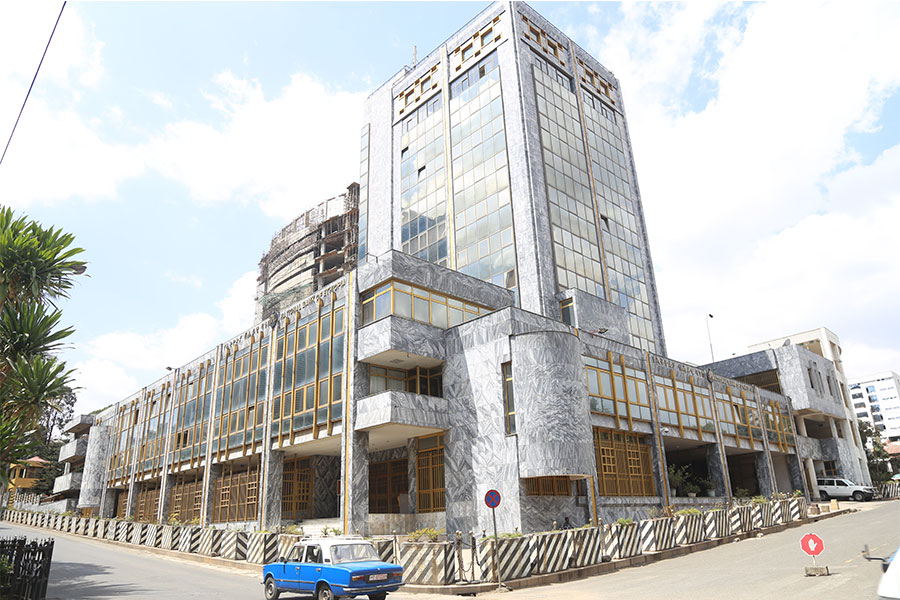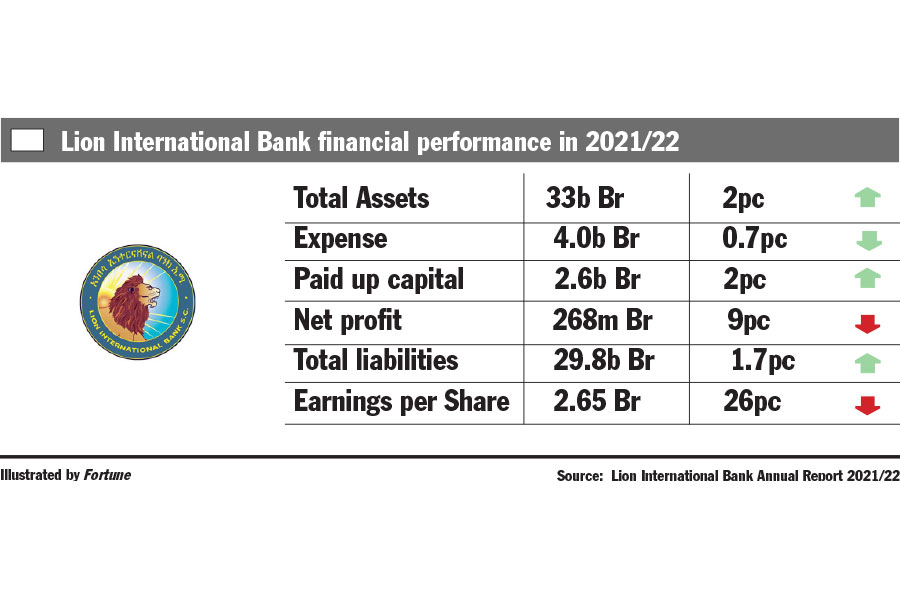
Fortune News | Nov 30,2019
Wegagen Bank has staged a remarkable turnaround by nearly doubling its net profit and boosting earnings per share (EPS) in the fiscal year 2023/24. The resurgence proved the Bank's resilience after arduous years of political instability, as well as foreign currency shortages and commodity price volatility.
It posted a net profit of 1.6 billion Br, rewarding shareholders with 36.9pc EPS, an impressive 14.2 percentage points increase from the previous year, while the industry average hovered around 38.4pc.
The increase in profitability comes despite an environment where many banks face heightened pressures on margins and asset quality. Wegagen Bank’s ability to expand its loan book, whilst maintaining healthy deposit growth, is attributed to a carefully managed liquidity strategy and an appetite for risk that has so far been rewarded. Analysts see central to this growth the Bank's leverage, with an equity multiplier of 7.14; for every Birr of equity, the Bank controls over seven Birr in assets. While moderate by international standards, this level of leverage proved Wegagen's effective use of assets to fuel growth.
"We devised strategies to enhance operations and create value for shareholders despite macroeconomic fluctuations," said Board Chairperson Abdishu Hussien.
The Bank focused on loan collections and optimised fund management to ensure liquidity, a critical move as the National Bank of Ethiopia (NBE) imposed a regulatory credit cap. Income surged by 40pc to 9.8 billion Br, reflecting balanced growth in financial and non-financial intermediation. Interest income from loans, treasury instruments, and savings climbed 32.5pc to 7.18 billion Br, with 93pc derived from loans and advances.
According to Abdulmenan Mohammed (PhD), a London-based financial analyst, achieving such growth is phenomenal considering the credit cap. Non-interest income also saw substantial gains. Fees and commission income soared 56.2pc to 2.15 billion Br, while gains on foreign exchange dealings skyrocketed 232pc to 354.52 million Br.
"It's a remarkable improvement," said Abdulmenan.
Despite the impressive recovery, Wegagen Bank's executives face the pressing task of curbing rising operating costs and addressing asset quality concerns to sustain growth as escalating costs tempered positive revenue growth. Operating expenses rose 29.3pc to 7.5 billion Br, while interest paid on deposits increased 20.9pc to 2.38 billion Br. Employee wages and benefits grew 31.1pc to 3.2 billion Br, an industry-wide trend of competitive talent acquisition and inflationary pressures.
Other operating expenses surged 66.8pc to 1.28 billion Br, which warrants close attention to ensure long-term benefits.
Provisions for impaired loans also rose slightly by 1.5pc to 269.3 million Br, but provisions for impaired assets increased 25pc to 410.8 million Br, pointing to potential asset quality concerns. Maintaining a provision of 739.12 million Br over two years revealed underlying risks in the asset portfolio.
"These provisions reveal the need for vigilant credit risk management to prevent future impairments from eroding profitability," Abdulmenan observed.
Wegagen Bank's President, Aklilu Wubet (PhD), attributed the rise in operating costs to necessary investments in human resources and compliance with International Financial Reporting Standards (IFRS). He defended the increased provisions as crucial measures to respond to future risks.
"We're resilient," he told Fortune.
Resilient Wegagen Bank was, with its total assets growing by 22.9pc to 65.73 billion Br. It disbursed loans and advances of 43.3 billion Br, an increase of 13pc, and mobilised deposits of 52.13 billion Br, up 21.8pc. The loan-to-deposit ratio dropped to 83.1pc from 89.48pc the previous year, partly due to the credit cap and deposit expansion. Return on average assets stood at 2.7pc, while return on average equity was 19.9pc, compared to last year's 1.7pc and 22pc, respectively.
The Bank also bolstered its liquidity position, increasing liquid assets by 44.8pc to 13.12 billion Br and raising its liquid assets ratio from 16.9pc to 20pc. Such profit growth denotes effective cost management and a higher return on the assets and equity deployed in the business.
"This strong position provides a buffer against market volatility," Aklilu told Fortune. "But, it also presents an opportunity to deploy excess liquidity into higher-yield investments."
Under Aklilu's leadership, Wegagen Bank's capital adequacy ratio increased to 16.9pc, twice the regulatory minimum, unveiling a robust capital base to absorb future shocks or pursue growth initiatives. With undergraduate studies in accounting, economics, and business management and a doctorate in banking policy, Aklilu's career spans roles at the state-owned Commercial Bank of Ethiopia (CBE), Bank of Abyssinia, Anbessa Bank, and Nile Insurance. He was appointed President in February 2022, the seventh CEO since its incorporation in 1997.
Wegagen was established by 16 founding shareholders who raised an initial capital of 30 million Br. It has expanded its network to 436 branches. Temesgen Berhe manages one of the oldest branches near Mesqel Square, where she credits the re-engagement of dormant accounts and attracting new customers as critical successes. She also attributed open communication between staff and executives to empowering the workforce.
"We adhered to the KYC [know your customers] requirements set by the central bank," Temesgen said, planning to expand digital services and integrate members of savings and credit cooperatives into the Bank's customer base.
Shareholders' confidence remains high, too.
Mulu Bisrat is among the 11,883 shareholders who praised the executives for steering the Bank away from "negative narratives" and reclaiming the institution's strength. He expressed satisfaction with the Bank's progress and plans to buy more shares.
"It's reached a new height," he told Fortune.
Despite its achievements, the Bank operates in a highly competitive environment where the CBE outpaces it more than tenfold, amassing a staggering net income of 21 billion Br. Awash Bank also stands far ahead, achieving a net income of 8.1 billion Br. However, with a net income of 1.7 billion Br, Wegagen finds itself among mid-tier performers in the banking industry, positioned between United and Anbessa banks.
Wegagen Bank also trails behind private commercial banks like Dashen Bank and Bank of Abyssinia, which reported net incomes of five billion Birr and four billion Birr, respectively. These banks have demonstrated greater profitability through customer acquisition strategies and digital transformation efforts. According to industry analysts, Wegagen Bank's performance reveals an area where its market strategy might require recalibration to maintain relevance. They urged operational efficiencies as a focal point; Wegagen may need to embrace digital finance and customer-centric models to keep pace.
Wegagen's capital adequacy ratio was 13.9pc, illustrating its executives' conservative approach to financing assets, higher than the industry's average of around 12pc. With equity growing at 33pc year-on-year, the Bank appears to be building a solid foundation to steer through a high-inflation environment and increasing credit risk. Its loan-to-asset ratio of 65.9pc unveiled an aggressive posturing on credit expansion—the loan-to-deposit ratio of nearly 90pc signalled efficient utilisation of deposits but uncovered narrow excess liquidity.
In an economic environment of tightening monetary policy and rising interest rates, any slowdown in deposit growth or spike in loan defaults could pressure liquidity.
Net interest income remains the bedrock of Wegagen Bank's earnings, but the net profit margin relative to total assets is modest at 1.9pc. While Wegagen Bank has managed asset quality well thus far, according to Abdulmenan, this remains a critical focus as risks persist. With robust growth, where total assets in the industry expanded by 20pc and 25pc annually over the past decade, Wegagen Bank's high loan-to-deposit ratio and expanding loan book may position it as a major player in the banking industry.
However, the analyst warned that it could expose Wegagen Bank to systemic risks. While its turnaround could be commendable, sustaining this momentum demands vigilance in credit risk management and liquidity.
"Such a strategy requires sharp risk management, particularly as non-performing loans become a growing concern," said Abdulmenan.
PUBLISHED ON
Nov 16,2024 [ VOL
25 , NO
1281]

Fortune News | Nov 30,2019

Radar | Dec 02,2023

Fortune News | May 29,2021

Radar | Dec 24,2022

Radar | Sep 18,2021

Radar | Mar 13,2021

Radar | Oct 24,2020

Radar | Jul 07,2024

Fortune News | Mar 25,2023

Radar | Aug 17,2019

Dec 22 , 2024 . By TIZITA SHEWAFERAW
Charged with transforming colossal state-owned enterprises into modern and competitiv...

Aug 18 , 2024 . By AKSAH ITALO
Although predictable Yonas Zerihun's job in the ride-hailing service is not immune to...

Jul 28 , 2024 . By TIZITA SHEWAFERAW
Unhabitual, perhaps too many, Samuel Gebreyohannes, 38, used to occasionally enjoy a couple of beers at breakfast. However, he recently swit...

Jul 13 , 2024 . By AKSAH ITALO
Investors who rely on tractors, trucks, and field vehicles for commuting, transporting commodities, and f...

Oct 25 , 2025
The regulatory machinery is on overdrive. In only two years, no fewer than 35 new pro...

Oct 18 , 2025
The political establishment, notably the ruling party and its top brass, has become p...

Oct 11 , 2025
Ladislas Farago, a roving Associated Press (AP) correspondent, arrived in Ethiopia in...

Oct 4 , 2025
Eyob Tekalegn (PhD) had been in the Governor's chair for only weeks when, on Septembe...